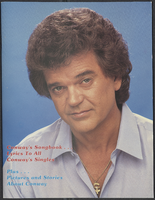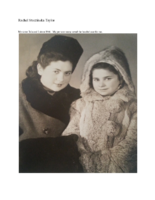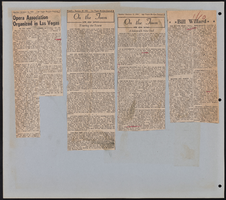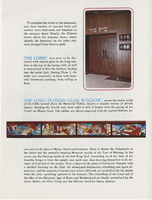Search the Special Collections and Archives Portal
Search Results

Interview with Clifford Olsen, September 20, 2004
Date
Archival Collection
Description
Text

Conway Twitty: newspaper clippings and news releases
Date
Archival Collection
Description
Folder from the Frontier Hotel and Casino Collection (MS-00297) -- Entertainers file. Copyrighted songs have been redacted. Original physical materials are available for viewing in the UNLV Special Collections and Archives reading room.
Mixed Content

Danny Cluff oral history interview: transcript
Date
Archival Collection
Description
Oral history interview with Danny Cluff conducted by Claytee D. White on December 8, 2017 for the Remembering 1 October Oral History Project. In this interview, Danny Cluff discusses his attendance at the Route 91 Harvest music festival on the evening of the October 1, 2017 mass shooting in Las Vegas, Nevada with his friends and nephew. He talks of finding safety in Hooters with other survivors from the concert. When speaking of gun control, he discusses his perspectives on human nature, citing his experiences during and after the concert shooting. Throughout the interview, Cluff speaks of the ways he has healed and kept positive after the shooting, such as laughing through the hard times and writing poetry, of which he gives a few samples.
Text
Jamie Ross (PACT Coalition for Safe and Drug-free Community) oral history interview conducted by Kelliann Beavers and Elia Del Carmen Solano-Patricio: transcript
Date
Archival Collection
Description
From the Lincy Institute "Perspectives from the COVID-19 Pandemic" Oral History Project (MS-01178) -- Community organization interviews file.
Text

Transcript of interview with William Morgan by David G. Schwartz, October 21, 2016
Date
Archival Collection
Description
Text

Biographical essay by Rachel Taylor, 2014
Date
Archival Collection
Description
Rachel Taylor describes her family's experience during the Holocaust in Poland in the Kutno and Gubin ghettos. She was able to escape with her sisters and brother with the help of a Polish priest and nun, and her parents survived Auschwitz-Birkenau. Taylor came to the United Staes in 1961.
Text
Gene Hertzog Professional Papers
Identifier
Abstract
The Gene Hertzog Professional Papers (approximately 1930-2015) are comprised of photographs, slides, transparencies, publications, video cassettes, correspondence, and digital files spanning Gene Hertzog's working years with the United States Army, the Bureau of Reclamation, and as a freelance photographer and videographer based in Southern Nevada, New Mexico, and Washington state. The collection documents the complicated infrastructure required to supply water to the Las Vegas Valley and includes still and moving images of the Springs Preserve, Lake Mead National Recreation Area, the Colorado River, and the Columbia Basin. The majority of the collection comes from Hertzog's time as a regional photographer for the Bureau of Reclamation and offers a unique glimpse into the Bureau's work in Southern Nevada, the southwest, and the Pacific Northwest from the 1950s to the mid-1990s.
Archival Collection

Virginia T. Lanier interview, March 16, 1981: transcript
Date
Archival Collection
Description
From the Ralph Roske Oral History Project on Early Las Vegas collection OH-01060. On March 16, 1981, collector Heidi G. Hughes speaks to Virginia T. Lanier at the collector’s home in Las Vegas, Nevada. Lanier talks about living on the Strip in Las Vegas, Nevada in the 1950’s and 1960’s. She speaks about her experiences riding the bus, working in food service, and what the Strip was like during the time period.
Text


